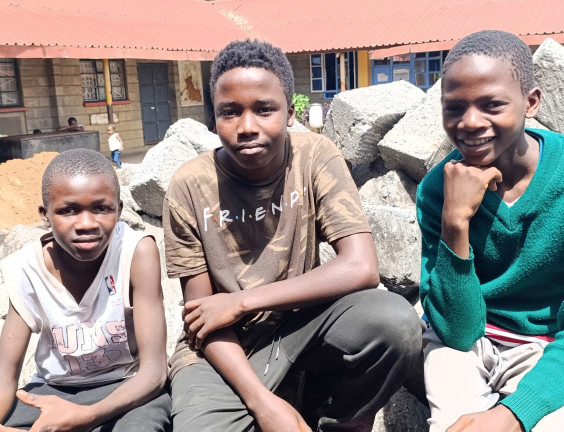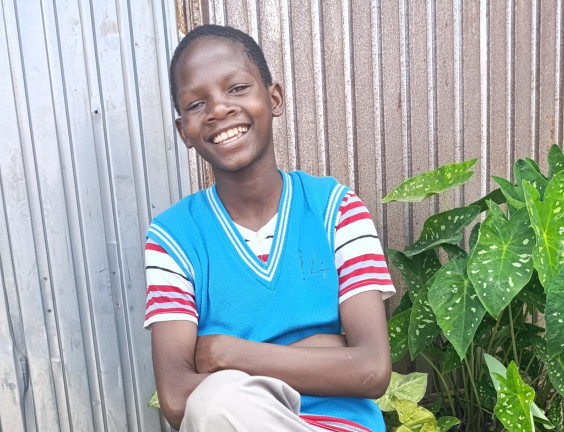“My goal is to help my family and people around us. I want to make life easier for everyone, especially with things like food and good housing.”
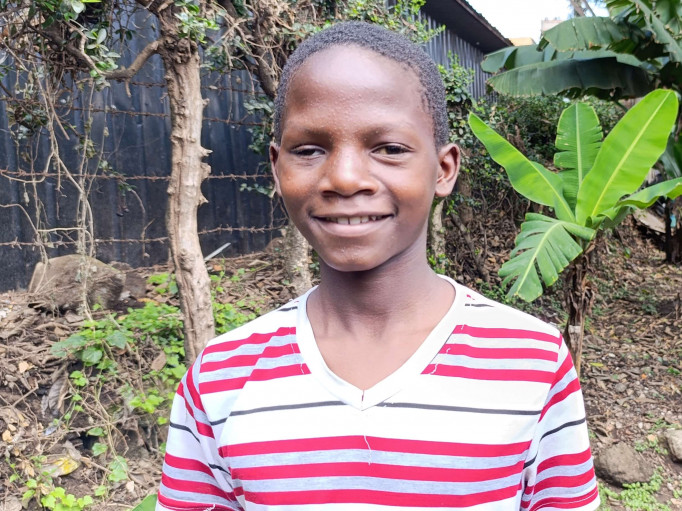
Across the world, the effects of climate change are becoming harder to ignore, particularly for children and families living in vulnerable situations. During an emergency, families who are already struggling are often forced to make impossible choices. For many, this means leaving everything behind in order to survive. However, this displacement brings new challenges when children are pushed further into poverty, education is disrupted and threats to their safety increase.
13-year-old Sokoro (pictured above) lives in a slum community in Nairobi, Kenya, with his mother, Vita, two sisters and 4-month-old niece. Life hasn’t been easy for the family. When the eye condition he was born with required urgent medical attention, Vita was left with no choice but to leave their rural home and move the family to the city in search of treatment.
Vita reflects on this time, “I was too young, and it was too much of a burden for me, emotionally and financially. I had to sell our belongings to raise enough for transport to Nairobi, let alone leave any money for medical treatment.
I visited the hospital where they examined Sokoro and informed me his eye was completely beyond repair. They asked for Ksh 400,000 for eye removal, which I could not afford. I went to another hospital where they asked for the same amount. Finally, I visited the National Hospital where they asked for Ksh 500,000. I could not afford that money. I gave up and waited for fate.”
Eventually, thanks to a free medical eye clinic camp, Sokoro’s damaged eye was removed and later replaced with an artificial one. “They examined his condition, and they were concerned, I, with other 31 patients were selected for free medical sponsorship. I was so grateful to God,” Vita shares.
To give her children a better chance in life, after Sokoro's surgery Vita decided to stay in Nairobi. However, life in the city proved tough.
Pictured below: (L) Sokoro with two sisters Salima and Baraka (R) Sokoro in his community in Nairobi.
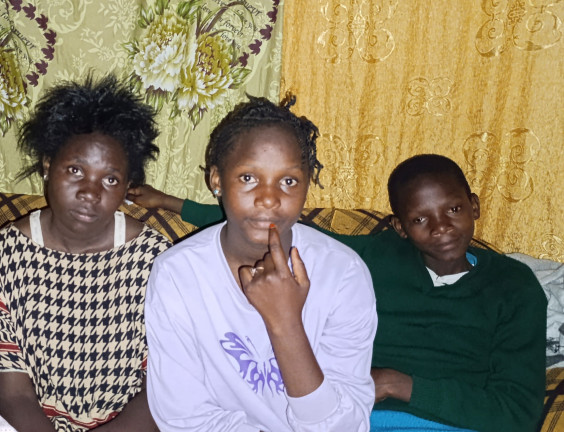
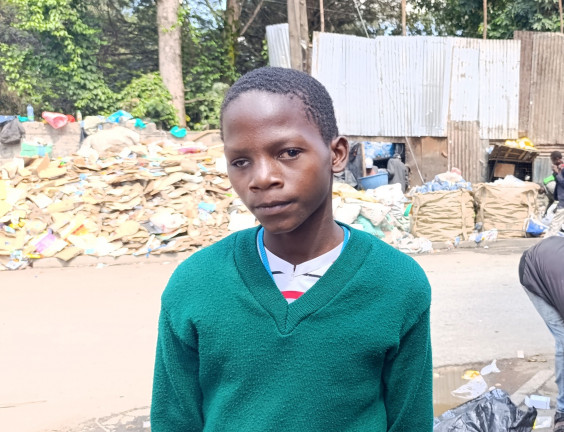
As time passed, Sokoro’s father, who had long battled clinical depression, grew increasingly unwell. He was later diagnosed with epilepsy and eventually returned to his home village while Vita and the children stayed in Nairobi.
Vita explains, “This was the most difficult period of my life, it’s only by God’s grace that I survived. I had children to feed, house, rent and school fees to pay, and a sick husband who required medical care. The stigma associated with my husband’s mental health also affected me and my children. My husband mostly slept on the streets. I loved him but there was nothing much I could do. Sometimes, I could not sleep thinking the worst may happen to him.”
In the summer of 2024, when the floods hit the area where they were now living, the family lost almost everything. After moving into a temporary shelter during the flooding, they returned home to see their community had been demolished by the government. Forced to resettle in a new, unfamiliar place, Sokoro was as unable to enrol into school due to changes to the registration process and increased costs Vita simply could not afford.
Sokoro reflects on this time,“After the floods came, we were moved to the shelter up in the primary school. We stayed there for a while and then came to this place. I was separated from many of my friends and neighbors which made me feel sad, because we loved each other. We were not able to join school when we came here. The school asked for a lot of money and my mother did not have money. I would just hang around with my sister - we had no friends. I started to go near the neighboring garage to collect some scraps to make toy cars which I could gift the boys around or sell and make little money. I did not know what else to do with my life.”
Pictured below: (L) The flooded Githurai River in Nairobi in July 2024. (R) An empty space where hundreds of homes in Nairobi's slums were destroyed by heavy rainfall.
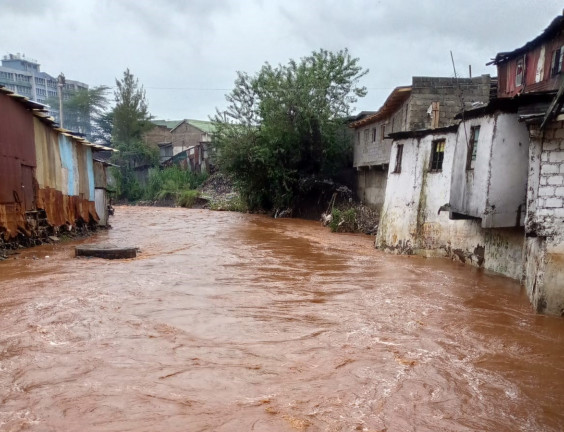
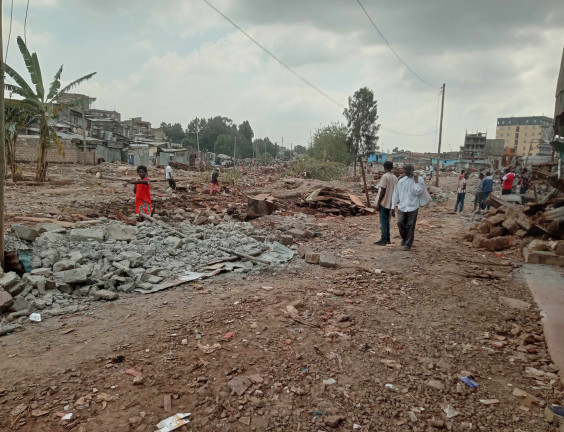
Everything began to change when a Community Child Protection Volunteer connected Sokoro and his family to Toybox’s local partner Pendekezo Letu (PKL). The team visited them and, as part of their respondse with families affected by climate-related displacement and emergencies, they began the process of supporting Sokoro and Baraka to enrol into school.
“One day, one of the community leaders came to our home with Francis (PKL’s Project Officer) and asked us why we do not go to school. We explained to them. From that time, Francis invited me to attend the project activities and later took us to school,” Sokoro explains.
“Since the school is far, we wake up at 5am to prepare so that we arrived in good time. Walking to school every day is tiring and sometimes even dangerous because of the thieves, speeding motorcycles and matatus* along the road. We get home around 6pm. Once home, we wash our clothes and do household chores which my mother allocates to us. If we have school homework, we do it as we wait for my mother to come from work,” he shares.
Sokoro explains that there are days when their mother can’t find work meaning there will be no money to buy food; "Sometimes we eat little, or we may go without supper."
As part of a Toybox-supported project, Sokoro has recently been taking part in Child Rights and life skills sessions run by PKL. These sessions offer critical psychosocial support and help children process trauma from experiences like climate-driven displacement.
“During the Child Rights sessions we were taught the numbers to call in case a child is abused,” Sokoro shares. He also expresses how the life skills sessions have improved his confidence, “When I first came to the sessions, I was not comfortable because I did not know many people. I didn’t feel courageous. I didn’t know if people will love me. We were taught how to love and appreciate oneself and to be confident… now I am happier.”
Pictured below: (L) Sokoro and Baraka in their school uniforms, (R) Sokoro taking part in a Child Rights session with PKL.
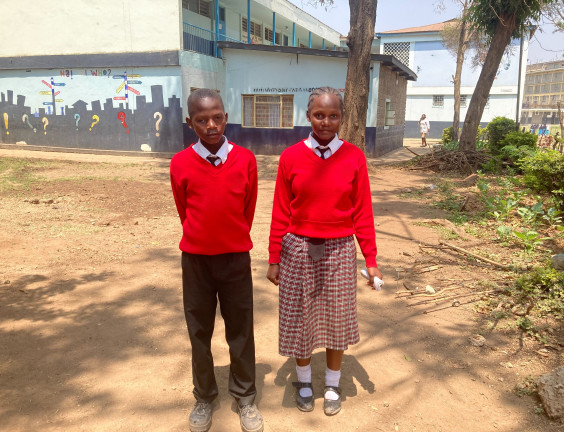
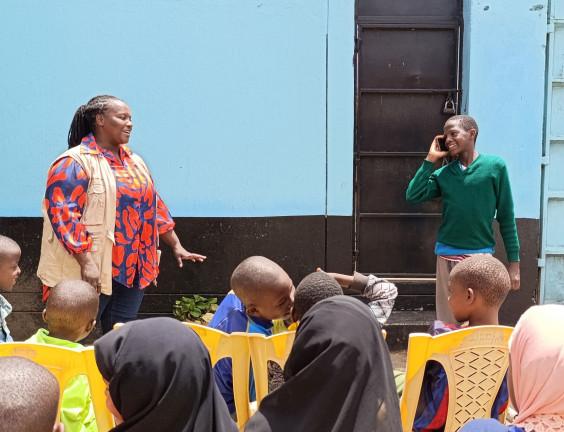
Francis from PKL reflects on Sokoro’s journey, “Being displaced from their living spaces causes children mental and emotional distress. When they move to unfamiliar places, it causes worry and confusion. They realise how unwelcome they are in the community.
During the first sessions of interaction with Sokoro, he was hesitant and very guarded. He spoke little and had low self-esteem and difficulties interacting with other children. One notable issue was that he very much avoided eye contact. As I continued interacting with him, I realised he was blind in one eye, had just been displaced by the floods into a new area and had not made any friends.
Slowly, he has started opening up. Today, Sokoro has friends and can talk freely. He is ambitious and goal orientated. The project has given him a safe space to connect with new friends and now, he’s much more confident and engaged during group activities.”
In the future, Sokoro dreams of becoming a mechanical engineer. “I want to make things that move, like the wire cars I build. I want to make real cars someday.” he explains. But his dreams don’t stop there. “My goal is to help my family and people around us. I want to make life easier for everyone, especially with things like food and good housing.”
Thanks to people like you, Toybox and PKL can continue to walk alongside Sokoro and other street children whose lives have been upended by the climate crisis - helping them access education, rebuild their confidence and rediscover hope for the future.
*Matutu’s are privately owned minibuses used as shared taxis, predominately in East Africa. Often overcrowded and fast-moving, they form a vital part of local transport but can pose serious safety risks.
Pictured below: (L) Sokoro with his friends at the project. (R) Sokoro smiles for the camera.
